
Contemporanea-Revista de Sociologia da UFSCar
Scope & Guideline
Advancing sociological discourse for a global audience.
Introduction
Aims and Scopes
- Critical Sociology and Social Theory:
The journal emphasizes critical approaches to sociology, examining the implications of neoliberalism, capitalism, and state politics on society. It encourages discussions that interrogate established sociological paradigms and propose new theoretical frameworks. - Empirical Research in Contemporary Issues:
A significant focus is placed on empirical studies that address pressing social issues such as precarious work, urbanization, and the impact of technology on citizenship and community life. This includes explorations of local contexts and their global connections. - Interdisciplinary Approaches:
The journal promotes interdisciplinary research that integrates insights from various fields such as anthropology, political science, and cultural studies to enrich sociological discourse and analysis. - Social Justice and Marginalized Voices:
There is a strong commitment to social justice themes, particularly in highlighting the experiences and struggles of marginalized groups. This includes discussions around race, gender, and class dynamics in Brazilian society. - Decolonial and Postcolonial Perspectives:
The journal encourages contributions that engage with decolonial theories and postcolonial studies, reflecting on the historical and ongoing impacts of colonialism in sociological research and discourse.
Trending and Emerging
- Neoliberalism and Its Discontents:
Recent publications increasingly address the implications of neoliberal policies on various sectors, including education, labor, and social services. This theme is crucial as it interrogates the socio-economic impacts of neoliberalism, particularly in the Brazilian context. - Technology and Society:
There is a growing emphasis on the relationship between technology and social structures, particularly in how digital applications shape citizenship, work, and social interactions. This trend highlights the need for sociological inquiry into the implications of technology on everyday life. - Urban Studies and Spatial Dynamics:
Emerging themes related to urban studies, including the analysis of urban conflict, gentrification, and the experiences of marginalized communities in urban spaces, reflect a heightened interest in understanding the complexities of urban living in contemporary society. - Social Reproduction and Care Work:
The exploration of social reproduction and care work, particularly in relation to gender dynamics and economic precarity, is gaining prominence. This reflects a broader recognition of the importance of care work in sustaining communities and the economy. - Decolonial and Anti-Colonial Perspectives:
There is an increasing interest in decolonial theories and practices, especially in understanding the legacy of colonialism in shaping contemporary social issues. This theme is particularly relevant in discussions around race, ethnicity, and identity in Brazil and beyond.
Declining or Waning
- Traditional Sociology of Professions:
The exploration of traditional professions and occupational sociology seems to be waning, as newer themes related to precarious work and gig economies gain traction. This shift may indicate a move away from established professional categories toward a focus on more fluid and unstable work arrangements. - Historical Sociological Analysis:
There has been a noticeable decrease in papers dedicated to historical sociological analyses, particularly those that do not directly relate to contemporary issues. While historical context is still important, there seems to be a growing preference for research that addresses current social challenges. - Conventional Gender Studies:
While gender remains a significant topic, conventional gender studies that do not engage with intersectionality or contemporary socio-political contexts are appearing less frequently. The focus has shifted towards more complex analyses that incorporate race, class, and sexuality. - Nationalistic Sociological Perspectives:
Themes centered around nationalism and state-centric analyses are becoming less prominent, possibly reflecting a broader global trend towards transnational and cosmopolitan perspectives in sociological research.
Similar Journals
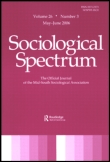
SOCIOLOGICAL SPECTRUM
Connecting research and theory for impactful insights.Sociological Spectrum is a prestigious journal published by Taylor & Francis Inc, dedicated to advancing scholarship in the fields of sociology and political science. With a notable impact factor and ranked in the Q1 category for both disciplines, this journal stands out as a vital resource for researchers, professionals, and students seeking to engage with cutting-edge research and theoretical developments from 1981 through 2024. The journal’s Scopus rank places it in the top 78th percentile within the social sciences community, reflecting its significant contribution to the field. While the journal is not open access, it provides comprehensive insights and fosters critical discussions around contemporary sociopolitical issues, making it an essential avenue for scholarly communication. Published in the United Kingdom, the ISSN 0273-2173 and E-ISSN 1521-0707 editions ensure broad accessibility, serving an international audience dedicated to the complexities of societal structures.

Istanbul Universitesi Sosyoloji Dergisi-Istanbul University Journal of Sociology
Empowering sociological thought through open access.Istanbul Universitesi Sosyoloji Dergisi (Istanbul University Journal of Sociology), with ISSN 1304-2998 and E-ISSN 2667-6931, serves as a pivotal platform for the dissemination of sociological research and thought in Turkey and beyond. Published by the Faculty of Letters, Department of Sociology at Istanbul University, this journal is committed to advancing the discipline of sociology through open access, which has been available since 2017, ensuring that vital research reaches a broad audience. With a focus on a diverse array of sociological topics, the journal aims to foster interdisciplinary dialogue and provide a forum for innovative theoretical perspectives and empirical studies. By bridging local and global sociological discussions, this journal seeks to appeal to researchers, professionals, and students alike, reinforcing its status as an essential resource in the social sciences. The journal’s commitment to high-quality scholarship continues to enhance its visibility and relevance in the academic community.

Revista Pos Ciencias Sociais
Bridging theory and practice in social sciences.Revista Pos Ciencias Sociais, published by UNIV FED MARANHAO, CENTRO CIENCIAS HUMANAS, is an esteemed open access journal in the field of social sciences that has been disseminating knowledge since 2004. With the ISSN 1983-4527 and E-ISSN 2236-9473, this journal aims to foster critical discourse and innovative research that address pressing social issues in Brazil and beyond. Although specific metrics like the H-index and Scopus ranks are currently unavailable, the journal remains committed to advancing the field through peer-reviewed articles, comprehensive reviews, and empirical studies. Accessible to a global audience, Revista Pos Ciencias Sociais serves as a vital platform for researchers, professionals, and students dedicated to exploring and addressing the complexities of human society while enriching the academic community with diverse perspectives.
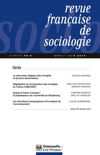
REVUE FRANCAISE DE SOCIOLOGIE
Shaping Conversations Around Societal StructuresREVUE FRANCAISE DE SOCIOLOGIE, published by PRESSES SCIENCES PO, is a prominent journal dedicated to the fields of sociology and political science, characterized by its rich historical contributions since its inception in 1977. With a commitment to scholarly excellence, the journal currently holds a Q3 ranking in its category for 2023, illustrating its relevance within the academic community. This esteemed publication offers a platform for innovative research and critical discourse, catering to both established scholars and emerging voices in the social sciences. The journal seeks to explore contemporary sociological issues through rigorous empirical analysis and theoretical reflection, fostering a deeper understanding of socio-political dynamics. Although it does not offer Open Access options, REVUE FRANCAISE DE SOCIOLOGIE remains a vital resource for researchers and students alike, providing access to cutting-edge scholarship that shapes the conversation around societal structures and political frameworks.
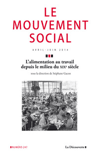
MOUVEMENT SOCIAL
Navigating the Complexities of Social DynamicsMOUVEMENT SOCIAL is a prominent academic journal published by PRESSES SCIENCES PO, focusing on the dynamic and evolving fields of history, sociology, and political science. Established in 1975, the journal has grown to become a valuable resource for scholars and practitioners interested in social movements, cultural trends, and political contexts in both historical and contemporary settings. With an ISSN of 0027-2671 and an E-ISSN of 1961-8646, MOUVEMENT SOCIAL is indexed in various databases, albeit with a current positioning in the category quartiles reflecting a Q3 ranking in History and a Q4 in Sociology and Political Science for 2023. Its Scopus ranks highlight the challenges faced in the competitive landscape of the humanities and social sciences, with particular focus on the journal’s contribution to discourse surrounding social transformations. This journal is dedicated to fostering critical thinking and providing insights into the mechanisms of social change, making it a critical platform for researchers, professionals, and students alike who are invested in understanding the complexities of societal evolution.

SOCIOLOGISK FORSKNING
Advancing Critical Discourse in Sociology and Political ScienceSociologisk Forskning is a prestigious open-access journal based in Sweden, focusing on the fields of sociology and political science. Established in 1996, this journal has evolved to be an important platform for disseminating innovative research and critical discourse in the social sciences. Published by the Socilogisk Forskning institution, it aims to foster interdisciplinary dialogue and promote insights that address contemporary social issues. With an impact factor that positions it in the Q3 quartile of its category as per the 2023 rankings, the journal ranks #1045 out of 1466 in the Scopus database, reflecting its relevance and contribution to the academic community. Since adopting an open-access model in 2015, it has enhanced the accessibility of its research outputs, allowing a wider audience of scholars, practitioners, and students to engage with and apply its findings. Subscribers and contributors to Sociologisk Forskning benefit from its robust commitment to critical empirical analysis and theoretical development in the evolving landscape of social science research.

ZEITSCHRIFT FUR SOZIOLOGIE
Connecting Contemporary Issues with Sociological ExpertiseZEITSCHRIFT FUR SOZIOLOGIE is a distinguished journal in the field of sociology, published by WALTER DE GRUYTER GMBH, a renowned academic publisher based in Germany. Since its inception in 1972, the journal has consistently contributed to the advancement of sociological knowledge, bridging theoretical frameworks and empirical research. With an impact factor reflecting its relevance in the academic community, it has achieved a commendable ranking of Q3 in the Sociology and Political Science category as of 2023. Its Scopus ranking positions it among the top half in its field, with a notable percentile of 49th. Although it does not offer open access, the journal remains a vital resource for researchers, professionals, and students seeking to explore contemporary sociological issues and critical analyses. Its comprehensive scope includes topics that address the complexities of social relationships and institutions, making it a pivotal publication for those committed to understanding the dynamics of society.

Sociologija
Unveiling Insights into Contemporary SocietySociologija is a pioneering, peer-reviewed journal published by the University of Belgrade, Faculty of Philosophy, dedicated to advancing the field of sociology and related social sciences. Since its transition to Open Access in 2002, the journal has made significant strides in disseminating vital research and fostering academic discourse within and beyond its Serbian context. As of 2023, it is classified in the Q3 quartile of the Social Sciences category, reflecting its contributions to the academic community, with a Scopus ranking of #188 out of 275 in General Social Sciences. The journal spans a convergence period from 2007 to 2024, inviting submissions that engage with contemporary sociological theories and issues. Sociologija’s commitment to open accessibility ensures that critical research reaches a broader audience, supporting scholars, practitioners, and students in their quest for knowledge and understanding of social phenomena. With its headquarters in Belgrade, Serbia, the journal serves as a significant platform for regional and international scholarship, and plays a crucial role in the global discourse on social science.
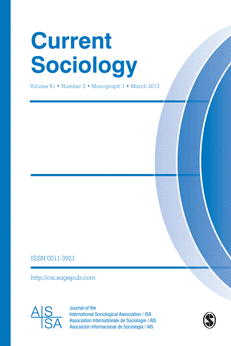
CURRENT SOCIOLOGY
Innovating Perspectives on Society and CultureCURRENT SOCIOLOGY is a prestigious academic journal published by SAGE PUBLICATIONS LTD, focusing on the dynamic field of sociology. Since its inception in 1952, this journal has been at the forefront of sociological research, bridging theoretical frameworks and empirical studies to address contemporary social issues. As evidenced by its impressive impact factor and notable ranking among the top Q1 journals in Sociology and Political Science, CURRENT SOCIOLOGY is recognized for its quality and contribution to the academic community, holding a commendable position within the 87th percentile of its discipline—#183 out of 1466 in the Scopus ranks. The journal's scope encompasses a wide range of sociological topics, providing a platform for researchers, professionals, and students to share their insights and foster discussions that shape our understanding of societal dynamics. While it does not currently offer open access, its rich repository of knowledge makes it a vital resource for those eager to explore cutting-edge sociological theories and findings.
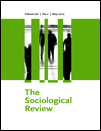
SOCIOLOGICAL REVIEW
Connecting research and policy for impactful change.Sociological Review is a premier journal in the field of sociology and political science, published by SAGE Publications Ltd and holding a prestigious Q1 ranking as of 2023. With its rich legacy dating back to 1908, this journal serves as a vital platform for disseminating cutting-edge research and critical discourse that shapes contemporary sociological and political inquiry. Based in the United Kingdom, it offers insights into diverse social theories, empirical studies, and pressing societal issues, appealing to researchers, professionals, and students alike. Although not an open-access journal, it maintains a strong impact within the academic community, reflected in its Scopus ranking of #266 out of 1466 in the Social Sciences category, positioning it in the 81st percentile. Through its commitment to high-quality scholarship and intellectual debate, the Sociological Review continues to influence both academia and policy, making it an essential resource for those seeking to engage with the complexities of society.